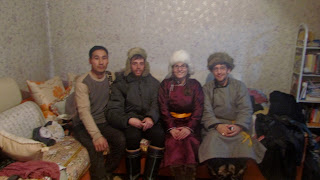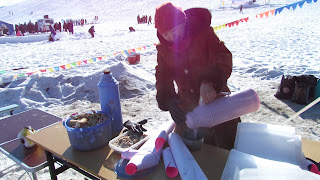Tsagaan Sar is the celebration of the lunar new year on the Tibetan calendar. Since the dates are based on the moon and decided by monks, they change every year but usually fall sometime in February. This year, Tsagaan Sar Eve, or Bituun, fell on Tuesday, February 21st. For arguably one of the most important holidays of the year, I traveled back to Selenge to visit my host family.
 |
| Snowy, Frozen Orkhon River |
I arrived in Orkhon Tuesday night after leaving my home in Baganuur at around 8 a.m. I was thrilled to be back in the home I spent my amazing summer in and back with the family I grew to love. I realized just how much my language skills have advanced as we sat around the kitchen table sharing stories and catching up on the past 6 months we’ve spent apart. My brother came home from school in UB for the holiday, but unfortunately my sister couldn’t come back from Russia. Still, I got to talk to her on the phone which was really nice. Bituun is traditionally spent with your family as you eat the last meal of the old year, which coincidentally, will be the same meal you eat for about a week as you visit friends and family. The typical Tsagaan Sar table spread is impressive and quite ubiquitous, reminiscent of the way many families' Thanksgiving tables yield the same foods year after year. Since Tsagaan Sar means white month, most of the food you’ll find on the table is also white. Massive towers of boov (fried pastry bricks made by hand and stamped with traditional symbols) are erected and hold an even larger, round boov on top covered with an assortment of white treats. My family’s tower was topped with aruul (homemade dried yogurt curds), sugar cubes, and white candy-covered peanuts. A variety of “salads” will also be present, the most common being niiclel salad, which is a mayonnaise-based spin off of potato salad. Next to the tower of boov, some sort of boiled animal carcass will be proudly displayed. My family had a sheep with the fatty tail bit still attached. As guests arrive, hot plates of buuz will appear (steamed, meat-filled dumplings) and served with suutei tsai (milk tea). Next, shots of vodka will circulate, usually accompanied by either airag (fermented mare’s milk) or a Mongolian weak milk vodka.
 |
| Eej heating homemade wax |
 |
| Our Tsagaan Sar Spread |
 |
| Making candles |
So on Bituun, all of our food was already prepared and we sat down together to eat our traditional meal, before walking across the yard to Emee (our grandmother’s) house and celebrating again with her. The next morning, we went outside to greet the first sunrise of the new year. Then, our first meal was again with our family, and we exchanged the traditional holiday greetings with each other, starting with the oldest family member. My dad fetched his furry hat and sat down as each of us approached, placed our arms under his elbows (a sign of support and respect) and said the appropriate greetings: “Amar baina uu?” “Saihan shinelj baina uu?” A quick side-to-side sniff of the hair later, we greeted the next person. If you greet someone the same age as you are, (after an awkward moment where both of you try to put your arms on bottom) you each place one arm on top and the other on bottom. After our breakfast buuz, we went to Emee’s house and repeated the meal.
 |
| Uncle Otgoo, Emee, Me, Eej |
Visiting is a central part of this holiday. The first day is (more-or-less) reserved for visiting your closest family members, the second for more distant relatives, and the last for friends. However, this is all relative since some people will be traveling very far to share these visits, making this holiday drag on for weeks. Since my Emee is 86 and probably the oldest living person in my town, she had an incredible amount of visitors of the first day. My mom and I helped her host as best we could.
At each home you visit, there is an unstated rule that anything you take should be in three’s. Eat at least three buuz, drink at least three shots of vodka. If I don’t eat buuz until next Tsagaan Sar, it will be too soon. Families prepare literally thousands of buuz ahead of time and freeze them outside in anticipation of the hordes of visitors they will receive. Also, families must give at least more than one gift to each visitor, making this holiday a little like Christmas in terms of gift-exchange, and a little like Halloween in terms of how much candy you’re sure to consume. Also, everyone gets dressed up in their fanciest new traditional clothes, and men pass around their prized snuff bottles to each greeted guest (and with this exchange, another complicated greeting and hand-off). I received all sorts of gifts, even from people I barely knew, including money, chocolates, cookies, phone units, a notebook, pens, aruul, boov, keychains, pencil cases, chopsticks, a scarf, lacy underwear, and a glittery black satin handbag. I was overwhelmed by their generosity. Accepting these gifts did feel a little odd since it is not customary for the visitor to return the gift. The typical gift-giving reciprocity does not apply here, and that was a strange adjustment for me.
 |
| Visiting Tumee with fellow PCV's |
I stayed several days at my family’s house in Orkhon and was able to visit old friends and my Mongolian teacher from the summer. Then I went to the neighboring town, Khutul, to visit a fellow PCV’s family who were like a second family to my own this summer. However, I arrived before they returned from visiting family in Darkhan, an hour away, so I was taken in by their relatives whom I had never met. The ritualistic meal and visit ensued, and after just an hour and a half with this family, I was included in their family photo session and sent off with yet more gifts. Back at the apartment of my friend’s family, we caught up on each others lived over buuz, tea, and several very competitive games of khuzer (cards). The next day, my friend’s Eej made us tsuivan, a welcomed break from buuz, as we looked for a ride back home. His host brothers begged us to stay until Sunday, but not wanting to arrive home exhausted on Sunday before Monday’s lessons, we insisted that we had to leave Saturday. We finally found a ride and were forced to eat more buuz before we left. After several hugs and promises to visit in the summer, we set off for home in a meeker full of nine people and two babies. I turned around to wave goodbye as his mom flung milk from the apartment windows—a blessing upon our long journey.
 |
| Our Family Altar |
Indeed we had no idea how long our journey was about to become. From Khutul, we were only about 4 ½ hours from UB, but after two hours had passed, our meeker started smoking uncontrollably, and we stopped along the road and waited, miles from the nearest town. What we were waiting for, I wasn’t sure. An hour passed and the sun was quickly ducking behind the mountains. Just a few hours ago, I was cursing the heater for being on full blast, suffocating me in my deel. Now, the windows had begun to ice from the inside. After two hours on the side of the road, the driver got the engine to turn over and we headed back towards Khutul with plans to stop in the first soum we encountered. About 20 minutes later, we arrived in the dark at a small town on the river. We waited at a closed gas station inside our meeker. The sheets of ice on the window were thickening, and I was assessing the situation, wondering what would happen next. Armed with all my Tsagaan Sar gifts, I knew I wouldn’t be hungry. And I had my sleeping bag with me if worst came to worst. My friend and I joked about rationing our Choco Pies and half-liter of water as the babies in the car became restless from the imminent cold. Five hours had passed, and I could see my breath as we waited for help. The driver was outside attempting to flag down cars in hopes of finding extra room for his passengers to join them en route to the city, but he had no luck. Eventually a bus came, and two lucky and fast women from our meeker boarded it before it zoomed away. I feared this would be the last bus for the night. However, after a little more time passed, another arrived and the driver successfully got it to stop and pick up me and my friend. We boarded the packed bus and quickly defrosted, balancing atop the buckets that had been placed in the aisle for us to sit on. Two and a half hours later, we were in UB just shy of midnight, and luckily found a hostel with vacancy where we could stay before the rest of our journey.
My first Tsagaan Sar seemed to last an eternity, while at the same time, was a whirlwind of activity. Even today at school, the festivities continue and deel-wearing teachers greet each other in the traditional manner. During this blog post alone, I have had to get up 11 times to greet my elders. I’m happy to be a part of a culture that is so hospitable and generous, and I am reminded that especially during this holiday.
















